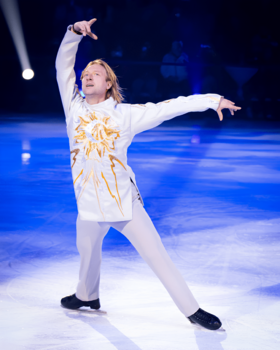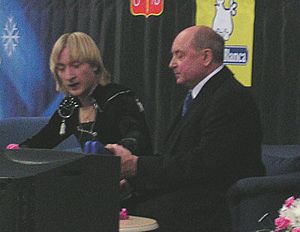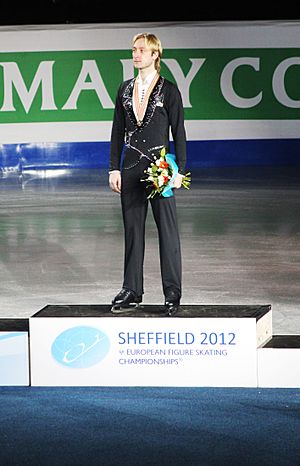Evgeni Plushenko facts for kids
Quick facts for kids Evgeni Plushenko |
|
|---|---|

Plushenko at the Champions Union show in 2023
|
|
| Personal information | |
| Native name | Евгений Плющенко |
| Country represented | |
| Born | 3 November 1982 Dzhamku, Solnechny District, Khabarovsk Krai, Russian SFSR, Soviet Union |
| Residence | Saint Petersburg, Russia |
| Height | 1.80 m |
| Choreographer | Maxim Staviski, David Avdish |
| Skating club | Yubileyny Sports Palace |
| Began skating | 1986 |
| Retired | 13 February 2014, 31 March 2017 |
| World standing | 160 (2015–16) 135 (2014–15) 67 (2013–14) 62 (2012–13) 24 (2011–12) - (2010–11) 34 (2009–10) - (2008–09) 44 (2007–08) 9 (2006–07) 2 (2005–06) 1 (2004–05) 1 (2003–04) 1 (2002–03) 1 (2001–02) |
Evgeni Viktorovich Plushenko (born 3 November 1982) is a famous Russian former figure skater. He is known as one of the greatest skaters in history. Plushenko has won four Olympic medals, including two gold medals. He is also a three-time World champion and a seven-time European champion.
Plushenko has won an amazing 22 titles on the Grand Prix circuit, which is a series of major international competitions. His four Olympic medals once tied the record for the most medals won by any figure skater. He is celebrated for his powerful jumps and artistic performances on the ice.
Contents
Early Life and Skating Beginnings
Evgeni Plushenko was born in a small town in the far east of Russia. Because he was often sick as a child, his mother thought exercise would help him. She signed him up for figure skating lessons when he was only four years old.
When Plushenko was 11, the ice rink in his hometown closed. His family knew he had great talent, so his mother took him to Saint Petersburg. There, he began training with the famous coach Alexei Mishin. This was a big move, but it helped him become a champion.
Plushenko quickly became one of the best young skaters in the world. At age 14, he became the youngest ever World Junior Champion. Just one year later, he won a bronze medal at the senior World Championships.
Skating Career
Plushenko's career was filled with amazing victories, tough rivalries, and incredible comebacks from injuries.
Rivalry and First World Title
In the late 1990s and early 2000s, Plushenko had a famous rivalry with fellow Russian skater Alexei Yagudin. They both trained with the same coach for a while. Their competitions were always exciting to watch. In 2001, Plushenko had a perfect season, winning every competition he entered, including his first World Championship title.
Olympic Journey
2002 and 2006 Olympics
At the 2002 Winter Olympics, Plushenko and Yagudin were the top contenders. After a fall in his first routine, Plushenko skated beautifully in his second program and won the silver medal.
Over the next four years, Plushenko dominated the sport. Going into the 2006 Winter Olympics in Turin, Italy, he was the clear favorite. He skated two amazing programs and won the gold medal, setting new world records for his scores.
2010 Olympics and Judging Controversy
After taking a break, Plushenko returned to compete at the 2010 Winter Olympics in Vancouver, Canada. He skated a strong program that included a quadruple jump, a difficult jump with four rotations. However, he won the silver medal, losing to Evan Lysacek of the USA, who did not perform a quad jump.
Plushenko felt the judging system was unfair. He believed that the quad jump, being the hardest, should be rewarded more. He said, "Without a quad it's not men's figure skating." Many people, including other skaters and coaches, agreed with him.
2014 Olympics and Retirement
Plushenko aimed for his fourth Olympics in 2014, held in Sochi, Russia. He helped the Russian team win a gold medal in the new team event. This was his fourth Olympic medal, a historic achievement.
Sadly, a back injury forced him to withdraw from the men's individual event. He announced his retirement from competitive skating right after. He officially retired in 2017 and opened his own skating school to train the next generation of skaters.
Records and Achievements
Evgeni Plushenko is famous for pushing the sport of figure skating forward. He was known for his difficult jumps and unique moves.
- The Biellmann Spin: He was the first male skater to perform the Biellmann spin, a move where the skater spins on one foot while pulling the other foot up and over their head.
- Jump Combinations: He was the first skater to land a quadruple toe loop-triple toe loop-double loop jump combination in a competition. He also created other difficult jump combinations that no one had done before.
- Quad Jumps: Plushenko has landed around 100 quadruple jumps in competitions throughout his career.
- Perfect Scores: Before the scoring system changed, he received 75 perfect "6.0" scores, showing how much judges loved his skating.
- World Records: Under the new scoring system, he set 13 world records.
Personal Life
Plushenko was married to Maria Ermak from 2005 to 2008, and they have a son named Egor.
In 2009, he married Yana Rudkovskaya, a music producer. They have two sons, Alexander and Arseniy. His son Alexander, often called "Sasha," is also a figure skater and performs in ice shows.
In 2007, Plushenko was elected to the government of Saint Petersburg. He later left politics to focus on his training for the 2014 Olympics.
Images for kids
-
Edvin Marton, Dima Bilan, and Plushenko at the 2008 Eurovision Song Contest. Plushenko skated on a small ice rink on stage.
-
Plushenko with teammate Yulia Lipnitskaya at the 2014 Olympic team event.
See also
 In Spanish: Yevgueni Pliúshchenko para niños
In Spanish: Yevgueni Pliúshchenko para niños
 | Leon Lynch |
 | Milton P. Webster |
 | Ferdinand Smith |







